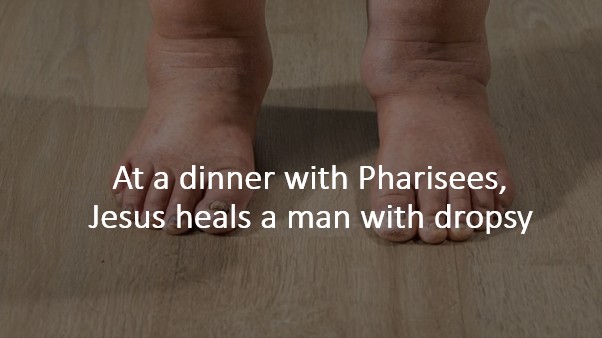This Sunday, the lectionary invites us to ponder Luke 14:1 and 7-14. The English Standard Version supplies the heading “Healing of a Man on the Sabbath,” to verses 1-6 and the heading “The Parable of the Wedding Feast” to verses 7-14.
Luke tells us of four times when Jesus healed people on Sabbath days. The first time, in a synagogue, he cast out a demon from a man.[1] The second time also in a synagogue, he healed a man with a withered hand.[2] The third time, again in a synagogue, he healed a woman who’d been bent over for 18 years[3] as we read last week. The fourth time is in our text for today.
Today, we read of Jesus healing a man with dropsy[4]. Not in a synagogue, but in the home of “a ruler of the Pharisees,” while attending dinner with several “lawyers and Pharisees.”
The story unfolds in occupied territory, like Malaya during the Japanese occupation from 1941-1945. Occupation rulers feel especially insecure because they’re foreigners. If they feel threatened, they will act. Quickly.
The sabbath was a distinguishing marker for the Jews – it’s a day of rest, a day for re-centring on God by reading his word, remembering why he made people, and how he relates to us.
There are right and wrong ways of reading and doing God’s word. And lawyers, also called scribes, and Pharisees, were the guides for doing so.
Everywhere, and at all times, there are rich people and poor people. Everywhere, and at all times, there are people who believe that health and wealth are signs of the blessing of God; or are the result of some principle like karma, receiving in this life what you earned in your last life.
Rich people are always considered threats by rulers: because they can use their wealth to turn people against the rulers. So, the rich and the rulers live according to rules; sometimes written, sometimes not.
So long as you dance according to the rules, so long as you ‘tango,’ you’re safe.
For example, 15th century Malacca had “sumptuary” laws. These restricted ownership of some things and set limits on others. According to some authors, only those granted permission by the Sultan could own cloths with gold threads. And there were limits to the number of tiers of a dais, the stage on which people sat. If you wanted to retain your wealth and position, you followed the cloth and dais rules. You tangoed.
Rich people often host dinners. Many social norms or rules are practiced at these dinners. The people who come to your dinners show everyone whom you’re connected to, how influential you are. Where you sit at the dinner table shows how important you are. And the conversations you lead, or add to, show why you are important.
It was no different in Jesus’ day. Pharisees only ate with other Pharisees or with people who had equal social status. And every guest longed for the host to place him in the position of honour.
Jesus was invited to dinner at the home of a leading Pharisee, a man honoured by his peers. We don’t know where he placed Jesus.
But why did he invite Jesus?
Luke doesn’t tell us. It was probably because Jesus had a reputation as a teacher and miracle worker, and because he’d said and done something most unusual when he healed the bent woman on the Sabbath.
We don’t know if the guest list included the synagogue ruler whose opinion Jesus had shut down; but we know Jesus demonstrated good knowledge of scripture and how to reason from it. We also know that people going to Jerusalem were often invited to dinner.
Now we ask, “what is dropsy?”
You have dropsy if your body retains water. You’ll be bloated. The underlying cause is heart or kidney trouble. Ironically, a person with dropsy, a water-logged person, always wants a drink. This is why ancient writers used dropsy to indicate greedy people, people who just kept trying to get more of everything.
At the dinner, Jesus was with men who only kept company with rich men. Partly because they were always looking for contacts, for leads, to get more wealth. Partly because they would’ve looked suspicious to the Roman rulers if they’d kept company with the poor. But mostly because they kept trying to get more of everything.
I think the man with dropsy was also a rich man, and a lawyer or a Pharisee. I think Jesus chose to heal him because he wanted to show that those who keep trying to get more of everything need to be healed.
Do we have dropsy? Can we tango like Jesus? Do we? Should we?
Peace be with you.
[1] Luke 4:31-37.
[2] Luke 6:6-11.
[3] Luke 13:10-17.
[4] Also known as oedama.
To learn more about Rama, click here.


